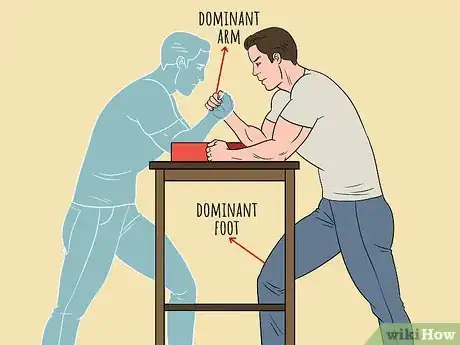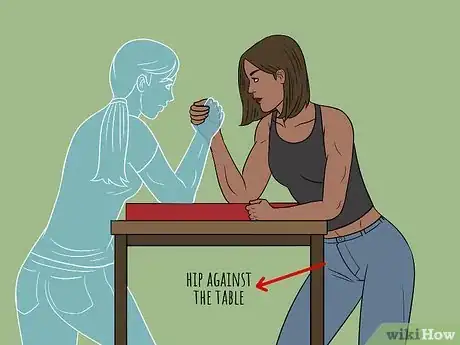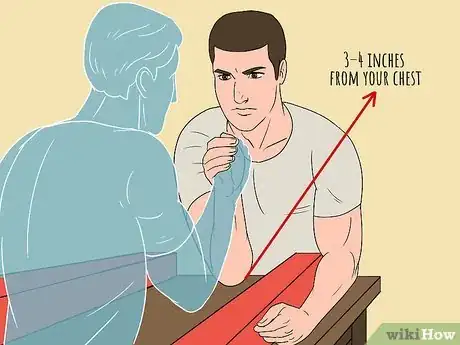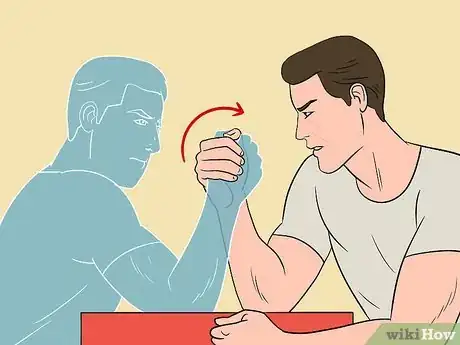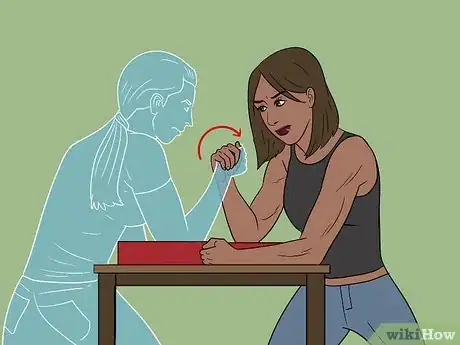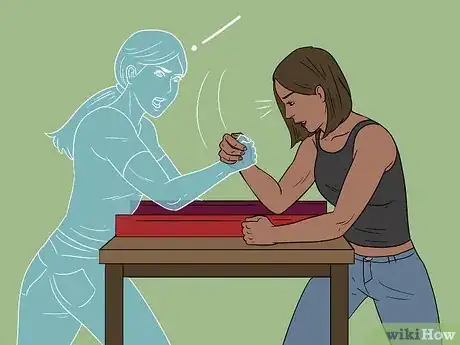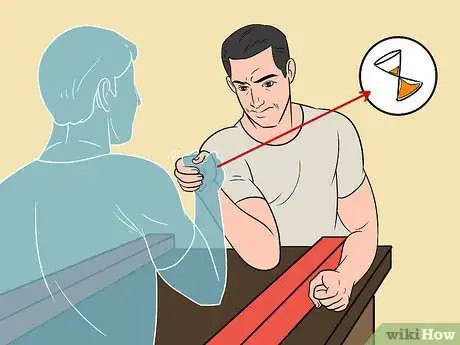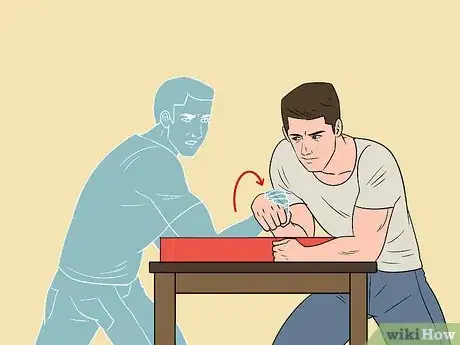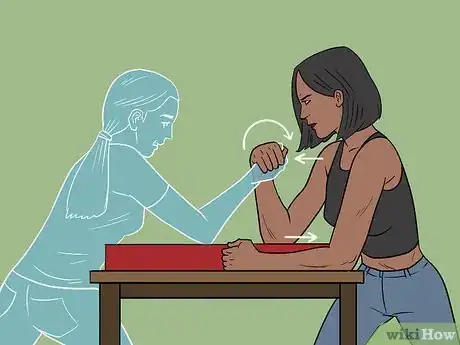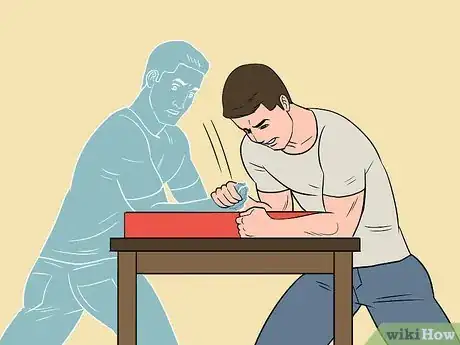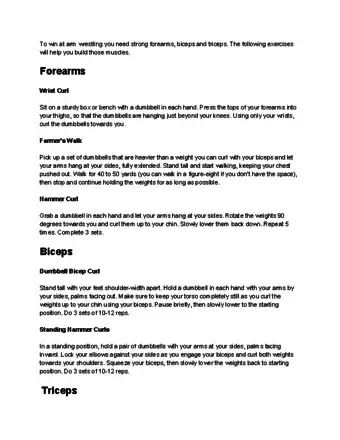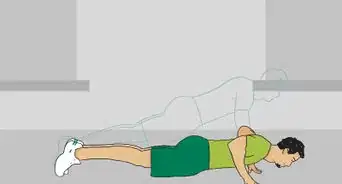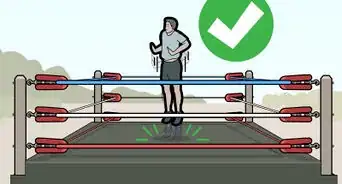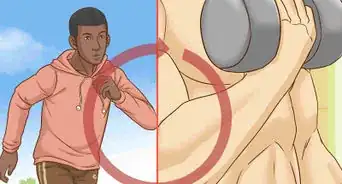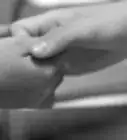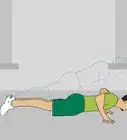This article was co-authored by wikiHow Staff. Our trained team of editors and researchers validate articles for accuracy and comprehensiveness. wikiHow's Content Management Team carefully monitors the work from our editorial staff to ensure that each article is backed by trusted research and meets our high quality standards.
There are 7 references cited in this article, which can be found at the bottom of the page.
wikiHow marks an article as reader-approved once it receives enough positive feedback. This article received 22 testimonials and 86% of readers who voted found it helpful, earning it our reader-approved status.
This article has been viewed 1,581,623 times.
Learn more...
Most people see arm wrestling as a battle of strength, but champion arm wrestlers know that technique is critical. In fact, winning an arm-wrestling match has less to do with brute strength than with the way in which you place your body and torso in relation to your opponent. Rather than trying to push your opponent's arm down, use your arm and shoulder strength to pull down on your opponent's hand.
Steps
Positioning Your Body and Arm
-
1Stand with your dominant foot forward. Place your right foot forward if you wrestle with your right arm, and your left foot forward if you wrestle left handed. Standing with your dominant foot facing your opponent will help you leverage some of your body and torso weight into your arm.[1]
- If you’re arm wrestling in a seated position, sit at an angle so that your dominant foot is closer to your opponent.
-
2Position your body so your hip touches the table, but not your whole stomach. Whether you’re standing or sitting, make sure to keep your stomach as close as possible to the surface you’re wrestling on. This means that, if you have your right foot forward, your right hip will be up against the table. [2]
- The closer your body is to the table, the more effectively you’ll be able to pull down on your opponents arm.
- If you stand or sit a few inches away from the table, you won’t be able to use your shoulder muscles in the arm-wrestling match.
Advertisement -
3Keep your upper arm centered in front of you and close to your body. Ideally, depending on the way your body is positioned, your elbow should only be 3–4 inches (7.6–10.2 cm) away from your chest. For maximum strength, wrestle with your arm centered in front of your body.[3]
- For an easy reference point, position your arm so that your thumb is directly in front of your nose.
- With this arm position, you’ll engage your shoulder and arm strength simultaneously, rather than using your arm strength alone.
-
4Grip your opponent's hand with your knuckles as high as possible. If you can, slightly arch your wrist when you lock hands with your opponent. If your hand is slightly elevated over theirs, you can exert more leverage and pull harder on their arm once the wrestling match begins.[4] If your hand is well positioned, your fingers will be directly over the nail of your thumb.
- If you’re wrestling in an official competition, the referee may insist that you keep your wrist straight and not curled.
Handling the Match
-
1Curl your palm inward to weaken your opponent’s wrist. Once the wrestling match begins, focus on weakening your opponent’s wrist. Do this by slowly orienting your palm toward your face so that your wrist turns in toward your shoulder. This will bend the other person's wrist forward and will make your grip stronger as they struggle to keep their grip.[5]
- If you don’t have the physical strength to do this, just keep your wrist straight.
-
2Make a quick move to surprise a stronger opponent. If you know that your opponent is stronger than you are, make a quick surprise move as soon as the match starts. Curl your palm inward and try to force your opponent's arm down before they can assert their strength. This may help you overcome their power.[6]
- Keep in mind that you might tire yourself out quickly if you aren't successful.
- Have a strategy! In arm wrestling, hand positioning and technique are more important than strength.
-
3Let your opponent tire themself out if you feel like you're losing. Sometimes the other person is just too strong for you to properly use your technique. If this happens, drop your wrist back to make it harder for them to push your arm down. Then, hold your position until they tire out. When they appear to be struggling, push their arm down.[7]
- Pretend like you feel confident that you're going to win. Your opponent doesn't know that you feel like you're losing, and looking confident may get them to give up.
-
4Perform a “top roll” once your strong opponent has worn themself out. As your opponent tires, pull your hand closer to your body to weaken your opponent’s arm and decrease their leverage. Slide your hand up so the center of your palm grips the top of your opponent’s hand. Then, as you push their hand down to the tabletop, pull the opponent's wrist back. Their palm should rotate towards the ceiling.[8]
- This move is more about leverage than brute strength. Putting pressure on your opponent's hand will force it open and make it more difficult for them to use their muscles.
- When performing a “top roll,” you can also pull your body back to draw out your opponent’s arm even more.
-
5Use the “hook” if you and your opponent are matched in strength. To “hook,” curl your wrist inwards. This will extend your opponent's arm, but will require you to put a lot of bicep power in. Lean in and position your body (especially the shoulder) over your arm and keep your body and arm close together. Drag your opponent towards you as you pull their arm down.[9]
- This technique is useful if you're as strong as your opponent in either forearm strength, bicep strength, or both. You’ll force your opponent’s wrist back to give yourself greater leverage.
- Maintain wrist contact throughout the match so that force is delivered through the wrists, rather than the hands.
-
6Force your opponent's hand down to the tabletop to win the match. To finish your opponent, rotate your body and position your shoulder in the direction you want your arm to go. That way, you'll be able to apply your shoulder strength and body weight to your opponent’s hand. Keep pulling and force their hand down to the table![10]
- So, if you’re wrestling right-handed, lean your right shoulder in towards your opponent. Or, if you’re left handed, lean your left shoulder in.
Exercises to Build Your Strength
Expert Q&A
-
QuestionHow can you build arm muscle without lifting weights?
 Alex Robles, MD, NASMDr. Alex Robles is a Physician, Certified Personal Trainer, and the Founder of the White Coat Trainer. Dr. Robles specializes in helping busy professionals get strong, build muscle, and lose fat. He holds a BS in Biology and an MD from Cornell University. He completed his OB/GYN Residency at New York Presbyterian Cornell. Dr. Robles is also a NASM Certified Personal Trainer.
Alex Robles, MD, NASMDr. Alex Robles is a Physician, Certified Personal Trainer, and the Founder of the White Coat Trainer. Dr. Robles specializes in helping busy professionals get strong, build muscle, and lose fat. He holds a BS in Biology and an MD from Cornell University. He completed his OB/GYN Residency at New York Presbyterian Cornell. Dr. Robles is also a NASM Certified Personal Trainer.
Certified Personal Trainer Try an exercise like the horizontal push—this includes the push-up and all kinds of push-up variations. It's all about training the muscles in the anterior upper torso, which includes your chest, triceps and shoulders. You can also try a vertical push, which primarily targets the shoulder and triceps muscles. For this exercise, get in a push-up position, walk your hands back towards your feet, and do a push-up by bringing your forehead down towards the ground.
Try an exercise like the horizontal push—this includes the push-up and all kinds of push-up variations. It's all about training the muscles in the anterior upper torso, which includes your chest, triceps and shoulders. You can also try a vertical push, which primarily targets the shoulder and triceps muscles. For this exercise, get in a push-up position, walk your hands back towards your feet, and do a push-up by bringing your forehead down towards the ground. -
QuestionIs it possible to win against someone who is stronger than me?
 Community AnswerYes. Twist back against their thumb, and that will loosen their grip. When that happens, they will be weaker and that is your chance to win.
Community AnswerYes. Twist back against their thumb, and that will loosen their grip. When that happens, they will be weaker and that is your chance to win. -
QuestionWhen I do any of these tips, my opponent does them too. They are stronger than me. What do I do?
 Community AnswerArm wrestling is a strength sport. Speed and technique can beat strength but strength can also beat speed and technique. If you have equal speed and technique, the stronger guy should win. I recommend you get stronger. Get in the gym and train your back, biceps, hand and wrist.
Community AnswerArm wrestling is a strength sport. Speed and technique can beat strength but strength can also beat speed and technique. If you have equal speed and technique, the stronger guy should win. I recommend you get stronger. Get in the gym and train your back, biceps, hand and wrist.
Warnings
- Arm wrestling is potentially dangerous. Many people have broken bones in their arm while arm wrestling, with the humerus bone being the most commonly broken.[11] Note that there is a possibility of suffering a compound fracture of the humerus bone and temporary nerve damage.⧼thumbs_response⧽
References
- ↑ https://effectiviology.com/how-to-win-at-arm-wrestling/
- ↑ https://effectiviology.com/how-to-win-at-arm-wrestling/
- ↑ http://sharpmagazine.com/2017/01/25/how-to-beat-a-bigger-guy-at-arm-wrestling/
- ↑ http://sharpmagazine.com/2017/01/25/how-to-beat-a-bigger-guy-at-arm-wrestling/
- ↑ https://www.gq.com/story/arm-wrestling-tips
- ↑ https://effectiviology.com/how-to-win-at-arm-wrestling/
- ↑ https://www.youtube.com/watch?v=IaT8-cA_AVU&feature=youtu.be&t=140
- ↑ https://www.artofmanliness.com/articles/the-art-of-manliness-guide-to-arm-wrestling/
- ↑ http://artofmanliness.com/2009/03/20/the-art-of-manliness-guide-to-arm-wrestling/
About This Article
To win at arm wrestling, start by getting into the ideal position with your dominant foot forward. Next, grip your opponent's hand, keeping your upper arm centered and close to your body, and work on forcing your opponent to tire themselves out. When they seem tired, pull your hand closer to weaken their arm and decrease their leverage. Finally, rotate your body and position your shoulder in the direction you want your arm to go, apply your shoulder strength and body weight to your opponent’s hand, and force it down to the table. For tips on beating someone who's stronger than you, read on!
